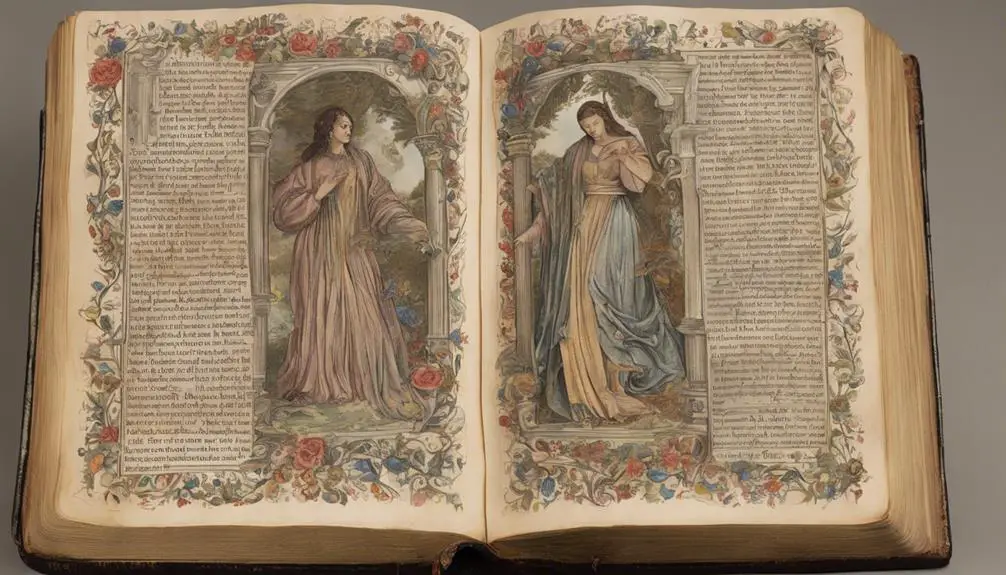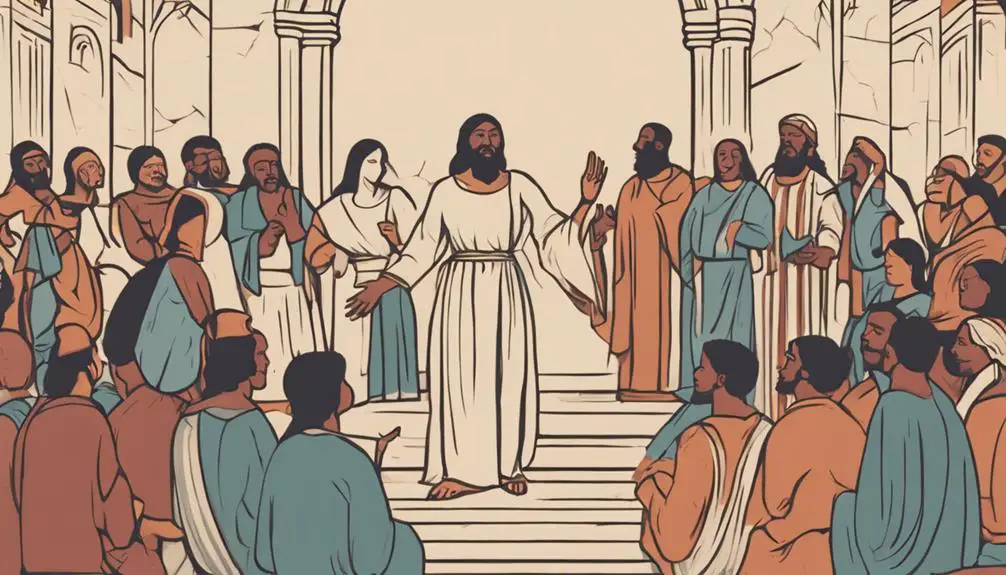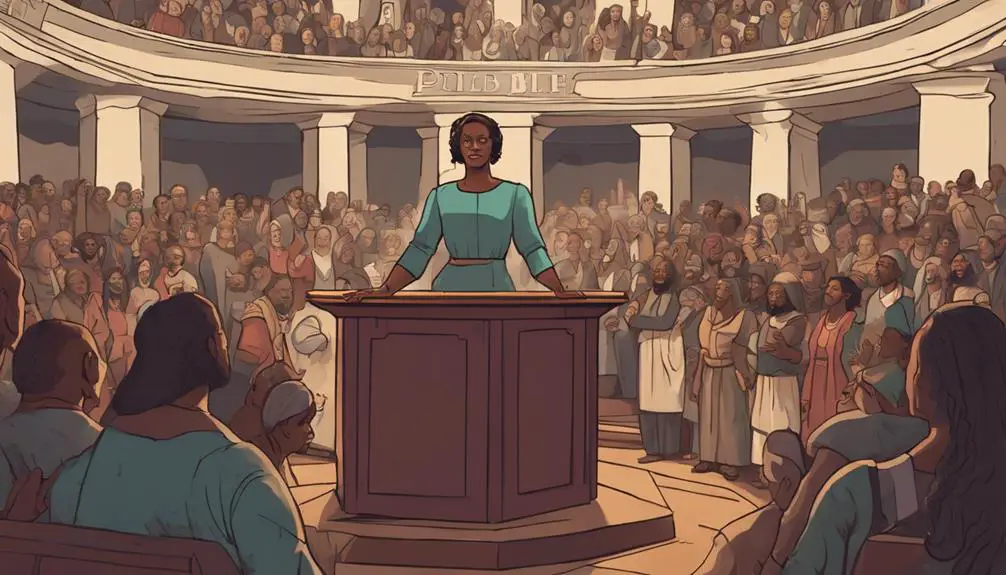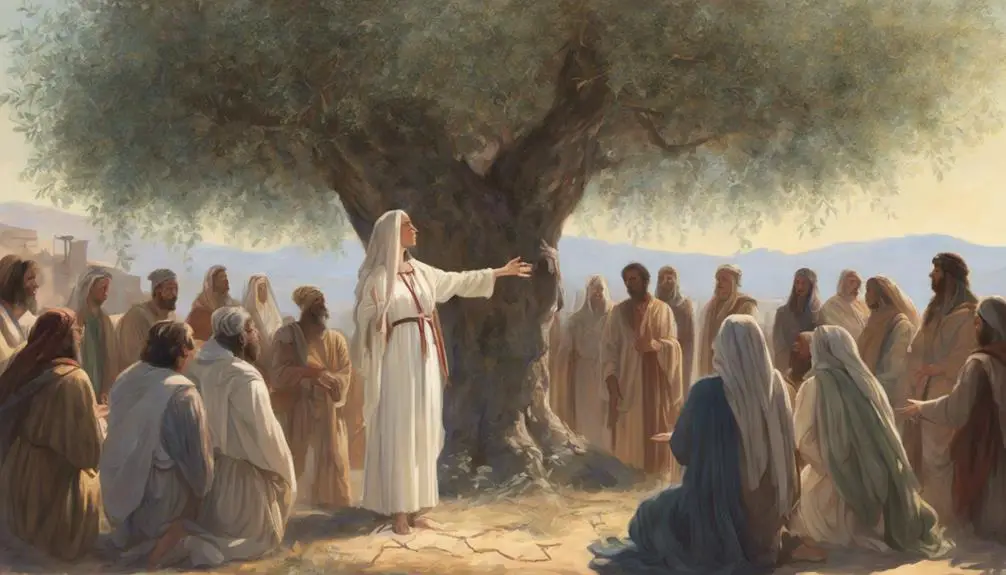Uncover the untold story of the first woman preacher in the Bible's King James Version, challenging traditional notions of spiritual leadership.

First Woman Preacher in the Bible Kjv
Isn't it curious that the gender roles we often take for granted today were not always so rigidly enforced? You'll find that in the King James Version of the Bible, there's a fascinating character who challenges these norms: the first woman preacher.
This may come as a surprise to you, and you're not alone. Many have overlooked her important role in Christianity's early days. But who is she? And how does her existence impact the traditional understanding of spiritual leadership?
Stay tuned to unveil the layers of this intriguing biblical figure.
The Biblical Narrative of the First Female Preacher

Delving into the Biblical narrative, you'll encounter the tale of the first female preacher, a figure whose audacious proclamation of faith blazed a trail in a patriarchal society. Your understanding of this narrative is crucial, as it informs your Biblical interpretation and shapes your comprehension of the preacher's identity.
The preacher in question is often identified as Deborah, a prophetess who held a position of leadership in Israel during a turbulent period. The Book of Judges (4-5) narrates her story, illustrating her distinctive role as a woman of faith, courage, and wisdom. She's not just a figurehead, but a participative leader who prophesies, judges, and even leads a military campaign.
In understanding her identity, it's essential to remember that Biblical interpretation isn't a monolith. You need to consider the historical-cultural context, the original audience, and the purpose of the text. Doing so will prevent simplistic readings that either overstate or understate Deborah's role.
Debunking Myths Around Women Preachers

Despite the undeniable presence of Deborah as a preacher in the Bible, misconceptions and myths persist about the role of women in religious leadership, often stemming from restrictive interpretations and cultural biases. These distortions often overlook the essence of gender equality that the Bible promotes, creating preaching restrictions based on gender rather than capability.
You might be familiar with the myth that women preachers are a threat to traditional religious authority, thereby violating God's ordained order. However, this notion lacks scholarly substantiation. In reality, the Bible neither expressly forbids women from preaching nor favors male leadership. Instead, it emphasizes the power of the Holy Spirit in guiding all believers, regardless of gender.
Another common misconception is that women's involvement in preaching is a recent, modern phenomenon, a product of the gender equality movement. Yet, historical accounts reveal women preachers in early Christianity, debunking this myth. Your understanding of scripture isn't limited by your gender but by your willingness to seek truth.
Impact of Female Leadership in Early Christianity

Building on the historical accounts of women preachers in early Christianity, it's important to recognize the significant impact they had on the development and expansion of the faith. These women, viewed through the lens of gender equality, were pioneers, challenging norms and contributing to the growth of the early church in profound ways.
You see, female leadership in the early church wasn't merely a side note; it was instrumental in shaping the faith's trajectory. Women preached, prophesied, and even held leadership roles – a fact that underscores the inherent equality within the early church. It's evident that their influence was substantial, helping to shape the church's doctrines, rituals, and practices.
Moreover, their leadership bolstered the faith's expansion. Their courage to step into roles traditionally held by men, their willingness to risk societal scorn, and their ability to effectively communicate the Gospel were all pivotal in the spread of Christianity. It's important to understand that their impact wasn't just religious but social too, subtly eroding gender barriers of the time.
In essence, women preachers in early Christianity were catalysts for change, embodying gender equality in the early church and leaving an indelible mark on the faith.
Challenging Traditional Perspectives

In light of these historical accounts, it's evident that women preachers in early Christianity didn't just contribute to the faith's growth; they actively challenged traditional gender roles, redefining societal perceptions and expectations. The presence of a woman in the pulpit, interpreting and teaching the Word of God, was a significant deviation from the gendered interpretations that dominated the era. They didn't merely challenge the traditional roles; they shattered them, giving rise to a more Progressive Christianity that recognized the spiritual capacities of both sexes.
These women's actions weren't just revolutionary; they were radical, profoundly influencing the Christian doctrine and reconfiguring the gendered dynamics of the time. Their actions questioned and redefined the prevalent patriarchal paradigm, showing that spiritual authority wasn't a male-exclusive domain. They proved that women could lead, teach, and shape religious thought just as effectively, if not more so, than their male counterparts.
In this way, the first woman preacher in the Bible KJV didn't just offer a new perspective; she instigated a paradigm shift, challenging the status quo and paving the way for a more inclusive, egalitarian faith.
The Legacy of the First Woman Preacher

Reflecting on this radical shift, it's essential to consider the enduring legacy left by the first woman preacher in the Bible KJV, and how her groundbreaking role has influenced modern Christian thought and practice. Her audacious spirit and her unique preaching style have undoubtedly paved the way for the evolution of roles in religious settings, particularly for women.
Preaching Styles |
Role Evolution |
|---|---|
Her style was characterized by a profound emotional depth and authenticity. |
Her role as a preacher challenged the traditional gender norms of her time. |
She was able to effectively communicate theological concepts in a manner that was accessible and relatable. |
Her contributions led to increased opportunities for women in religious leadership. |
Her sermons were imbued with a deep sense of compassion and empathy. |
She served as a trailblazer for future generations of women preachers. |
She adopted a narrative approach in her preaching, effectively utilizing storytelling. |
The impact of her role continues to reverberate in contemporary religious practices. |
This legacy, though often overlooked, persists in the style and substance of modern preaching, and the evolving roles of women in Christian leadership. She is not simply a historical figure, but an ongoing source of inspiration and a model for courageous innovation in the face of traditional constraints.
Conclusion
Despite enduring centuries of patriarchal norms, women have always played significant roles in Christianity. The King James Version of the Bible even notes the first woman preacher, Junia, as 'notable among the apostles.'
Today, about 11% of American congregations are led by women, challenging traditional perspectives and continuing the legacy of the first woman preacher. This highlights the enduring impact of female leadership in Christianity and the continued need for gender equality within religious institutions.



Sign up